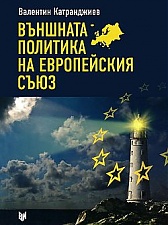Book review, Education and Science, EU – Baltic States
International Internet Magazine. Baltic States news & analytics
Friday, 26.04.2024, 09:19
On Katrandjiev’s book “The External Policy of the European Union”
 Print version
Print version |
|---|
Later on, due to the fact that accession process meant much and hard work in the field of adoption of the Acquis Communautaire, lawyers were more active to launch a series of books on the EU Law.
We have now a book of completely new approach to the EU policies and written by relatively younger generation of academics. Dr. Valentin Katrandjiev is author of the book “The External Policy of the European Union” published in late 2012 by Military Publishing Company in Sofia. This review is somehow delayed by many circumstances but at the same time the period passed since launching the book have proved its high academic quality among both students and researchers.
The book volume is 271 pages and it has concise abstract in English. At the first glance there is reasonable question why this book is produced by Military Publishing Company – the answer would be that in the free market economy all publishing companies are equal, but also the background of the author could explain it below. But let`s first make review of the book concept and structure. There are three main chapters, of which the first one is describing external policies of the EU as “structures and instruments”. From the structural point of view the author is focusing on the supranational essence of the EU external policies and further is developing analysis on the agreements for the free trade and economic partnership, the agreements in the area of development, namely the agreements for partnership and association. This approach is evidently pointing out the author`s intention to cover most recent processes of the EU external action and enlargement negotiations.
The second part of this chapter is dealing with the specific instruments the EU is entitled (or forced) to use, namely the economic aid for development, the humanitarian aid and the financial instruments of the EU. Here again we can see the updated view on the EU external politics taken from the current pattern of large involvement and humanitarian support offered by the EU worldwide. Interesting issues are debated, as the dilemma of the legal status of EU Delegations in third countries as seen from the diplomatic and consular traditions and following complications for their representatives when questions of sovereignity are discussed.
Special attention is also covering the history and development of the EU external policies as passing the period of CFPSP and the current CPSD with increased functions and tasks of the EU as global player within the frames of Lisbon Treaty and the appearance of the EU External Acton (EEAS) and involving various features of using diplomatic instruments as soft or hard” dealing of conflicts in security area.
While the third chapter entitled “Relations of the EU with leading international organizations” is quite short and weak (objectively there is not much material developed on the EU-UN or EU-OSCE relations), the second chapter is most interesting and inventive. Entitled as “Relations of the EU with key figures of the global politics” it is dedicated to unveil various case studies, namely – the relations of the EU with USA, with China, and with Russian Federation, following thorough presentation of the Turkish dilemma for the EU and current challenges of the EUROMED policies. Although describing the short aftermath of the Arab Spring processes most of author`s statements are still valid and applicable, – perhaps because of his good management of documentary sources.
It is of regret that editing book lasts quite long as for now we could possess a very good piece of EU foreign policy modeling within the tough circumstances related to the Ukraine crisis – given the author`s first hand expertise of the region.
The latter is evident from the Valentin Kantardjiev background description as promised above. He is a son of diplomat and as such has personal sensibility towards international relations and diplomacy. He had been graduated in international relations at Kiev State University in 1989 and obtained PhD in 2000 by “Patris Lumumba” University in Moscow with special focus in his thesis about the Samuel Huntington`s civilizations concept. Consequently Kantardjiev has been on fellowship at the Maltese Mediterranean Diplomatic Academy and contributing the Diplomatic Institute at the Bulgarian Foreign Ministry. At present he is teaching courses of “External Relations of the EU” and “External Policies of Russia” at the South-West University of Bulgaria.
Катранджиев, Валентин (д-р) – Външната политика на Европейския съюз
София, Военно издателство, 2012; 271 c.
Katrandjiev, Valentin – The External Policy of the European Union, Sofia, 2012, 271 p.
(Katrandjiev, Valentin – Vanshnata politika na Evropejskija sayuz, Sofija, Voenno izdatelstvo, 2012)








 «The Baltic Course» Is Sold and Stays in Business!
«The Baltic Course» Is Sold and Stays in Business!

